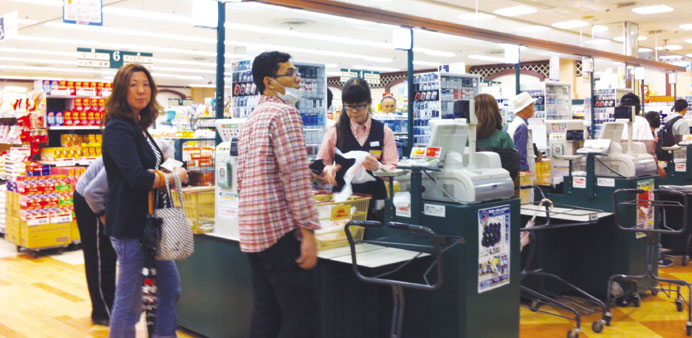Japan faces a run of decisive indicators next week, with economists polled by Reuters expecting July’s industrial output and consumer spending figures to show an uninspired recovery from the sting of April’s sales tax hike.
Industrial production is expected to rise 1% in July after a revised 3.4% month-on-month drop in June, the fastest fall since the March 2011 earthquake disaster, as companies slowed production to offset a build-up in inventories.
The trade ministry will announce factory output on August 29 at 8:50 am (August 28 at 2350 GMT) when it also releases manufacturers’ output forecasts for August and September.
“A sharp drop in factory output in June and accumulated inventories, especially in the auto sector, raised worries about output. So the focus will be on how the inventories pan out, and manufacturers’ output forecasts for August and September to see whether the negative view on output may be corrected,” said Yoshiki Shinke, chief economist at Dai-ichi Life Research Institute.
“In addition to factory output, household spending and retail sales will be closely watched to determine how much consumer spending and economic growth will recover in July-September.”
Retail sales are expected to rise for the first time in three months in July, but growth will be muted with consumers still cautious about spending after the tax increase and sluggish growth in wages. The data is due at 2350 GMT on August 28.
Household spending is forecast to have fallen an annual 3% in July, unchanged from June’s decline.
Core consumer inflation, which excludes volatile prices of fresh food but includes prices of oil products, is seen to have stayed steady at 3.3% in July. Excluding the impact of April’s sales tax hike, core consumer inflation is expected to be 1.3% in the year to July.
The unemployment rate is forecast to stay at 3.7% in July with the jobs-to-applicants ratio unchanged at 1.10, the highest in 22 years. The jobs data, consumer inflation and household spending figures are due on August 28.
Analysts believe the economy will return to a growth path from the third quarter but recent weak data cloud the outlook, and may put pressure on the government and the Bank of Japan to take further action to support growth.
Economists expect the economy will expand around 4% on an annualised basis in the current quarter after sales tax was hiked to 8% from 5% in April, driving the economy into a 6.8% contraction in the second quarter.
BoJ Governor Haruhiko Kuroda has stuck fast to his view that inflation is on track to reach the 2% target next year, but some expect the central bank will have to cut its growth and inflation forecasts at a half-year assessment on October 31.
Shoppers are seen at a supermarket in Tokyo. Retail sales in Japan are expected to rise for the first time in three months, but growth will be muted with consumers still cautious about spending after the tax increase and sluggish growth in wages, a Reuters poll said yesterday.

